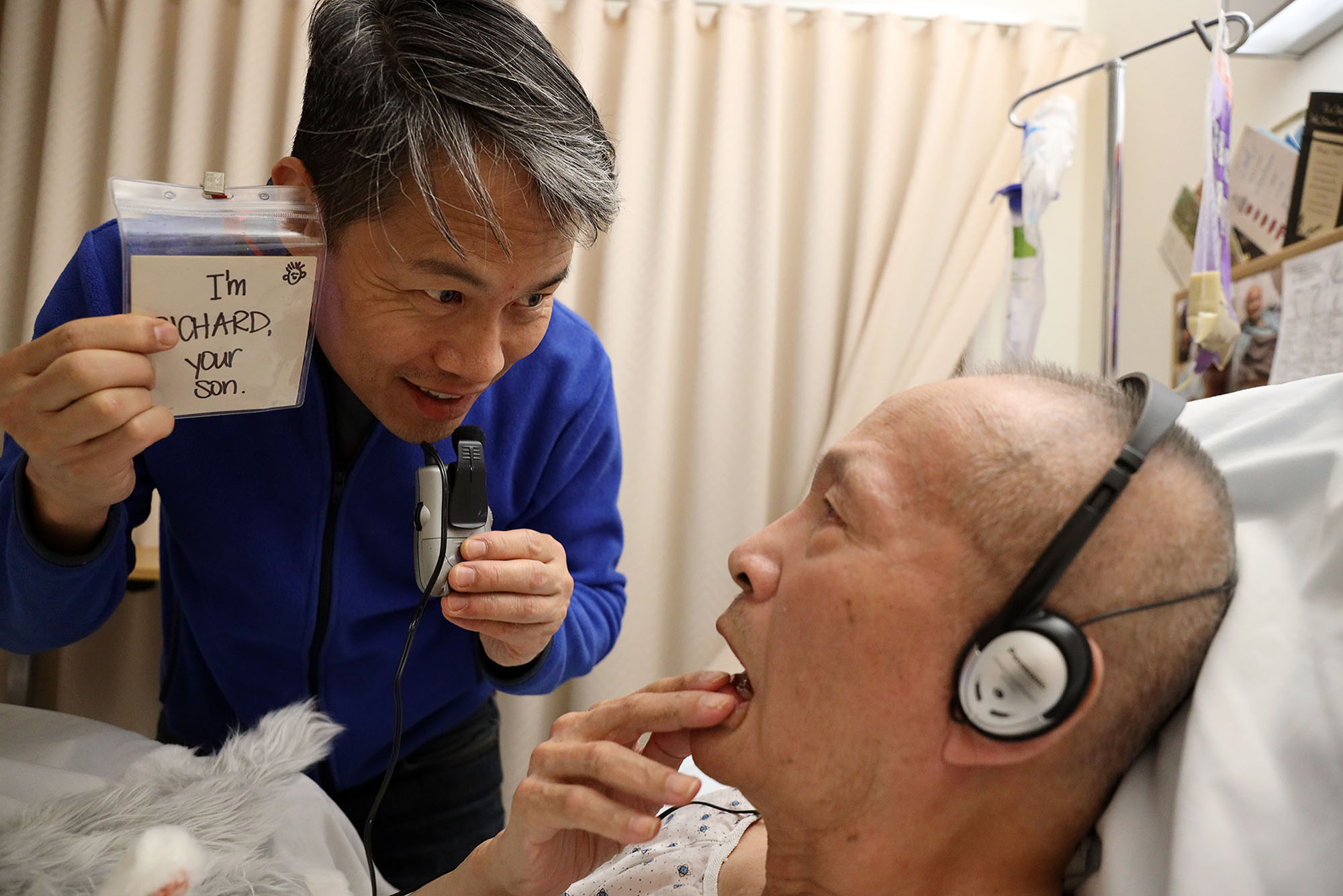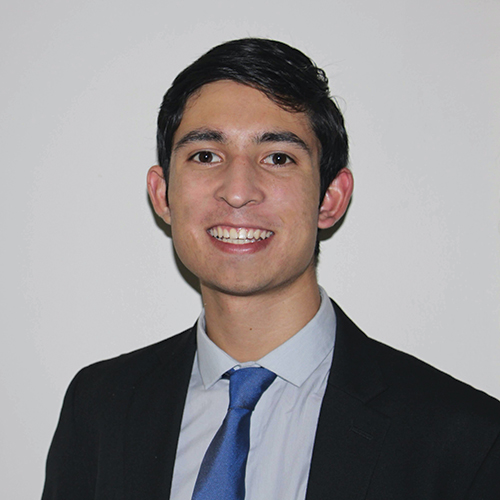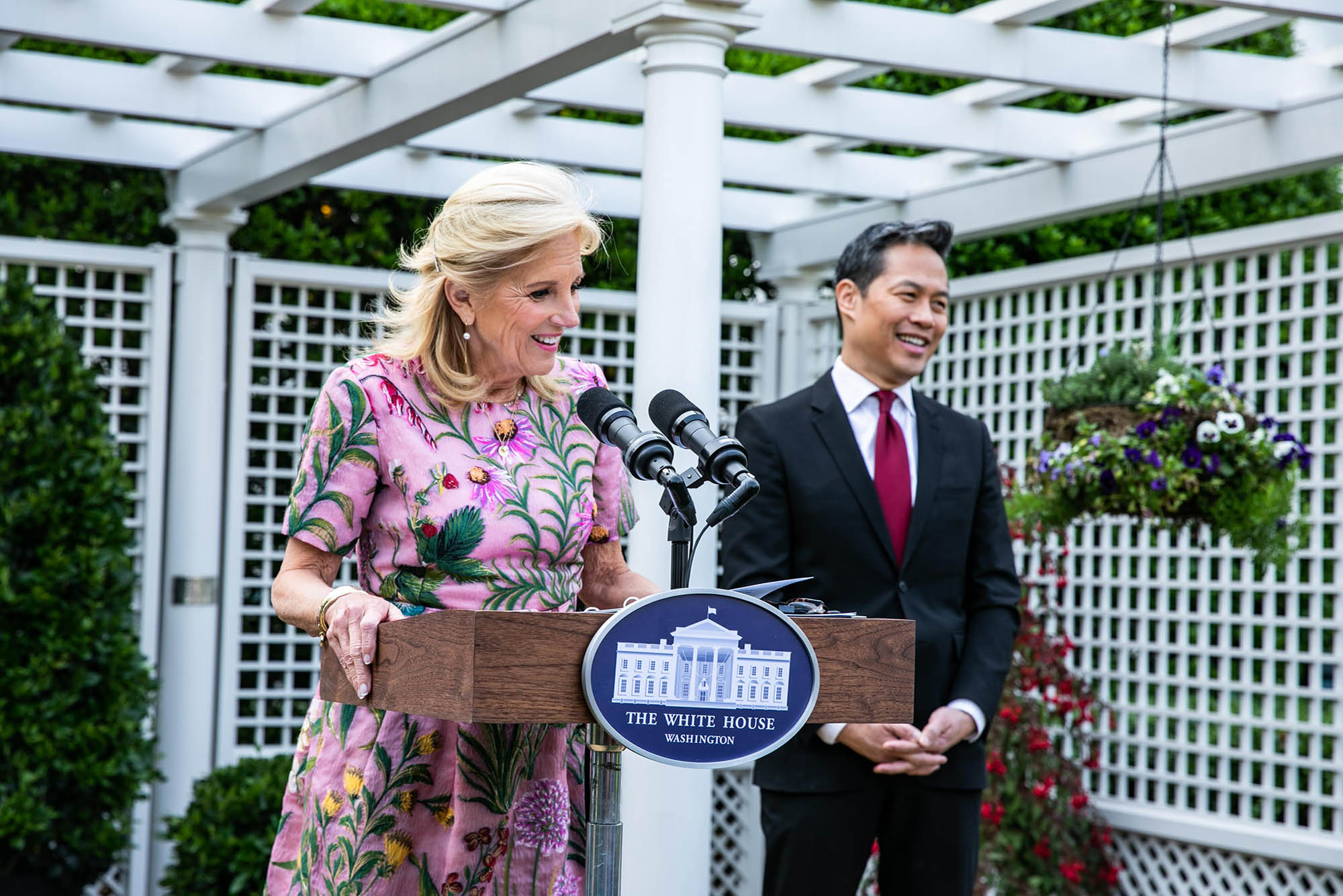Alum-Produced Documentary Screens at the White House
Unconditional highlights the mental health toll of caregiving for a loved one

Director Richard Lui with his father, who was diagnosed with Alzheimer’s in 2014. Their story is depicted in the documentary Unconditional. Photo courtesy of Unconditional
Alum-Produced Documentary Screens at the White House
Unconditional highlights the mental health toll of caregiving for a loved one
Alex Lo remembers learning when he was a kid that the White House had its own movie theater. Years later, a documentary on mental health and caregiving he produced would screen in that very theater.
“To be in that room, watching a movie I produced, was just really unbelievable,” says Lo (CAS’20, Pardee’20). “And what a privilege for the caregiving community to have this be an issue that the White House says deserves attention.”
The documentary, Unconditional, tells the story of three American families caring for a loved one with mental health or physical issues. It’s directed by MSNBC anchor Richard Lui, whose story of caring for a father with Alzheimer’s is depicted in the film. It follows the families over seven years, capturing the emotional toll of caregiving, complete with victories, heartbreaks, and every moment in between.

Unconditional premiered in early May and screened at the White House shortly after. Among the executive producers are journalist Maria Shriver and TV host Montel Williams, both dedicated patient advocates (Shriver is an Alzheimer’s nonprofit founder and Williams is a stroke survivor who lives with multiple sclerosis).
The movie’s tagline is “When minds hurt, love heals.” To Lo, Unconditional will always be first and foremost a story about love.
“Mental health and love are sometimes two surprising words to put together,” says Lo, who works as an assignment editor for NBC News. “The film shows how those things can exist at the same time, and how caring for someone, despite the challenges to your mental wellness, can actually be a source of strength.”
Lo recently spoke to Bostonia about his work on the film and what he hopes it means to viewers.
Q&A
with Alex Lo
Bostonia: You’ve worked with your mentor, Richard Lui, before, on the 2020 documentary Sky Blossom, which focuses on children caring for family members. What drew you to these two projects?
Alex Lo: It was the topic that initially drew me in, because it was one that hit really close to home. I’ve now helped out with caring for grandparents on both sides of my family who have Alzheimer’s and dementia. Before Richard brought up the topic of caregiving, I don’t know that I would have called myself an actual caregiver; I would have just said that I go help out with things back home when I can. But when I first started to hear these stories—and especially with Sky Blossom, where we focused on five families around the country with a child aged 12 to 22 helping care for a loved one—they really resonated. I was like, “Wow, this is something that I didn’t realize I was a part of, but I am.” That made it a story that I wanted to help get out there.
With Unconditional, we show the progression of how each family transformed over time and learned to deal [with where they were]. That drew me to the projects as well—as caregivers know, it’s a job that is not only physically taxing, but mentally taxing. There’s no getting around it. But we wanted to tell the stories of families who have been able to find ways to overcome that, and find strength that they didn’t know was there.

Bostonia: What did your work look like as a producer?
The day-to-day varies a lot, because producing involves seeing the project through from the beginning to the end. Right now, we’re in the distribution phase for Unconditional. We were just negotiating agreements with the different platforms we’re going to be on—broadcasts on MSNBC and PBS and theatrical release in AMC theaters. My role was to work with [the director] to reach out to those platforms and negotiate deals. That was alongside helping lead the promotional efforts around those platforms and [organizing] events like our world premiere or more local events with partners like AARP and the Alzheimer’s Association.
When we were making the film, my role was everything from helping identify the families [to feature] and trying to figure out which ones would be a good fit [for a larger narrative] to actually going on the ground with our filming team. Because we’re a small team—usually about five people—I would wear all the hats there. There’s the catering hat, the transportation hat, and the organizing logistics hat, as well as all the more editorial aspects of: “I’d like you to shoot this, I’d like you to shoot that.”
Then in the postproduction stage, that involved going between different teams to give them feedback and guidance. That part gets really involved, and I think that’s the part I enjoy about producing. As a director or a producer, you see the bigger picture of what you’d like the film to be, whereas other creatives you work with may be a little more siloed. So, you’re working with talented, creative people to figure out, like, what’s the best way of [animating this sequence] or [composing this section of the score].
Then at the same time, we were also figuring out the marketing: things like the movie poster, the trailer, the website, all of that. We were working with our PR folks to get press hits, and even managing our government affairs outreach, which resulted in the White House screening, as well as members of Congress from both sides of the aisle supporting the film and saying that they want to help caregivers out.
So it is all-encompassing when you’re a producer. But at the end of the day, that’s what’s so exciting about it. You learn about all sorts of different things. I can’t play a single note of music; whoever would have thought I’d learn about score composition and recording an orchestra?
Bostonia: What do you hope viewers take away from Unconditional?
With this one, especially, we wanted to show that you’re not alone in all of this. Oftentimes caregiving can feel like a very lonely road that you’re walking down. And you don’t realize that you’re actually part of a community of millions of Americans going through similar things. So, we wanted to help bring that out and show that there is great pride and joy to feel in being a part of that community. Caregiving can be really rewarding. And at the same time, we wanted to acknowledge that it’s really tough.
As for those who haven’t been a caregiver before, we hope they get a better sense of what it’s like and think about how they can help a friend or family member going through it. Because everyone knows someone who’s caregiving. I think that’s equally important in terms of outcomes. Also, I think the film helps change the narrative around how we see caregivers and how we see mental health as well. It’s turning both around from “this is something that is tough that we don’t want to talk about” to something that we see as a source of strength.
Learn more about Unconditional and where to watch it here.

Comments & Discussion
Boston University moderates comments to facilitate an informed, substantive, civil conversation. Abusive, profane, self-promotional, misleading, incoherent or off-topic comments will be rejected. Moderators are staffed during regular business hours (EST) and can only accept comments written in English. Statistics or facts must include a citation or a link to the citation.